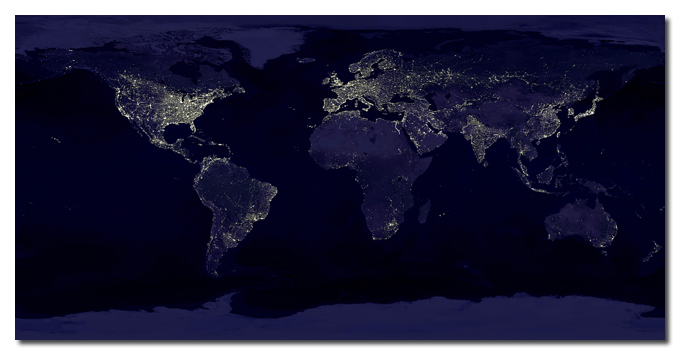"As Wednesday morning dawned, northern Norway was hit with an impact comparable to the atomic bomb used on Hiroshima." – Nina Lødemel, www.aftenposten.no, June 9, 2006.

The old joke is that "the difference between mathematicians and physicists is that mathematicians stare at their own shoes, while physicists stare at other people's shoes." Given how insignificant much of the activities of humanity are compared to how much time major media outlets spend on them (note that I post this in the wake of having to listen to stories about Jamie Lynn Spears), it is perhaps not surprising that I didn't find out about the above news story from any US media source, instead having to rely on my international news searches as part of my monthly research for astronomy-related news for the Syracuse Astronomical Society President's Message.
Ponder the headline for a moment. Norway. Impact. Atomic Bomb. Those of us that prefer the freezing cold outdoors with our scopes to crowded indoors with beverages already know that debris falls into our atmosphere all the time. If you believe the United States Geological Survey (USGS) estimate (and I see no reason not to), 1,000 tons of dust and debris fall to earth from space every year. A meteor shower is a predictable time to see matter speeding into our atmosphere and streaking across our field of view (which, of course, isn't exactly correct, as the Earth is actually speeding into a debris field during meteor showers), but you can be sure to see 1 to 5 meteors an hour by simply being outside any night. So, ponder the following. What if that Norway meteor had been 6 hours later and 20 degrees lower latitude (that's New York City, where I'm writing this post from). Or, perhaps, any other major populated area. Or, perhaps, just a location with a large enough population that a news story like the Norway impact would have made it beyond local headlines and a few internet news services. There are plenty of places to choose from if this map of human civilization is any indicator.
A random yet relevant quote from the movie Armageddon, 1998:
President: Dan, we didn't see this thing coming?
Truman: Well, our object collision budget's about a million dollars. That allows us to track about 3% of the sky, and begging your pardon sir, but it's a big-ass sky.
For the most part, humanity hasn't developed far enough where the potential catastrophes from "above" (hence the shoe-staring humor) are of as much concern as the potential disruptions "on the ground." I suppose, in the universal scheme of things, a species that hasn't progressed to the point that it's truly aware of its place in the universe and cognizant of the need to worry about the whole picture simply hasn't developed far enough where it will make a dent anywhere else in the cosmos, is a long way from being consequential, and, therefore, not yet worth any another, sufficiently-developed species' attention. We'll have matured as a species when we concern ourselves more with our persistence beyond the statistical averages of stellar and cosmic phenomena than with resource squabbles here on Earth.
From wikipedia.org:
Existential risk is a risk that is both global and terminal. Nick Bostrom defines an existential risk as a risk "where an adverse outcome would either annihilate Earth-originating intelligent life or permanently and drastically curtail its potential."
Fortunately, small groups of people have at least begun to think about, and plan for, existential risks such as the "global killers" of rock and ice that couldn't care less about the ongoing Writers' Strike, the Presidential Primaries, or Global Warming. The stuff from "on high" isn't our fault, so I think it something worth worrying about more than those things we do to ourselves, if for no other reason than intra-species conflict IS our collective fault and, as long as EVERYTHING is connected and EVERYTHING matters, someone can always connect the dots with James Burke-ian clarity to show that we somehow did it to ourselves.
With all that Christmas cheer in mind, I'm pleased to report my addition (click here for my snappy bio) to the Advisory Board of the Lifeboat Foundation, one of the precious few organizations that is looking up and looking around in efforts to guarantee the persistence of our species. I've been acquainted with Lifeboat by way of their financial director, Michael Anissimov, for quite some time, both through his excellent Accelerating Future blog and through some lively interviews, including one at Podcasting The Singularity and another at RU Sirius' Neofiles Show. Of course, my addition is to the Nanotech and Chemistry Boards, nothing astrophysics-related, but what the hey…
From the Lifeboat Foundation website:
The Lifeboat Foundation is a nonprofit nongovernmental organization dedicated to encouraging scientific advancements while helping humanity survive existential risks and possible misuse of increasingly powerful technologies, including genetic engineering, nanotechnology, and robotics/AI, as we move towards a technological singularity.
Lifeboat Foundation is pursuing a variety of options, including helping to accelerate the development of technologies to defend humanity, including new methods to combat viruses (such as RNA interference and new vaccine methods), effective nanotechnological defensive strategies, and even self-sustaining space colonies in case the other defensive strategies fail.
We believe that, in some situations, it might be feasible to relinquish technological capacity in the public interest (for example, we are against the U.S. government posting the recipe for the 1918 flu virus on the Internet). We have some of the best minds on the planet working on programs to enable our survival. We invite you to join our cause!
And keep your eye on Apophis.
www.aftenposten.no
www.aftenposten.no/english/local/article1346411.ece
www.msnbc.msn.com
www.cbsnews.com
abcnews.go.com
en.wikipedia.org/wiki/Jamie_Lynn_Spears
www.syracuse-astro.org
www.syracuse-astro.org/pastupdates.html
www.usgs.gov
www.usgs.gov/sci_challenge.html
en.wikipedia.org/wiki/Meteor_shower
en.wikipedia.org/wiki/Earth
en.wikipedia.org/wiki/New_York_City
apod.nasa.gov/apod/ap001127.html
www.seti.org
en.wikipedia.org
en.wikipedia.org/wiki/Existential_risk
en.wikipedia.org/wiki/Nick_Bostrom
n.wikipedia.org/wiki/2007_Writers_Guild_of_America_strike
en.wikipedia.org/wiki/Presidential_primaries
en.wikipedia.org/wiki/Global_warming
en.wikipedia.org/wiki/James_Burke_(science_historian)
www.k-web.org
lifeboat.com/ex/bios.damian.gregory.allis
lifeboat.com/ex/boards
lifeboat.com
www.acceleratingfuture.com/michael
www.bloggingthesingularity.com/2007/09/20/podcasting-the-singularity-01-is-heeeeeere
www.bloggingthesingularity.com/category/podcasting-the-singularity
mondoglobo.net/neofiles/shohw-78-immortality-or-oblivion
en.wikipedia.org/wiki/R._U._Sirius
mondoglobo.net/neofiles
lifeboat.com/ex/boards#nanotechnology
lifeboat.com/ex/boards#chemistry
en.wikipedia.org/wiki/99942_Apophis

